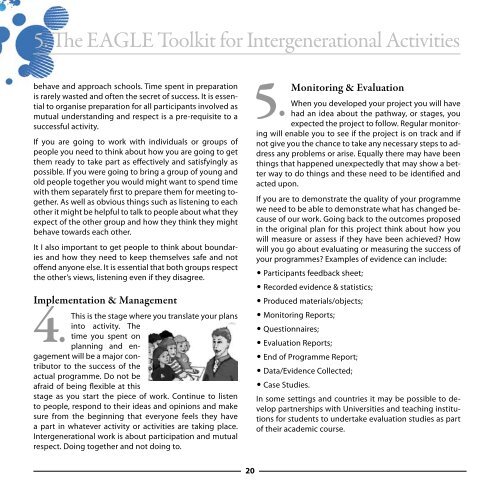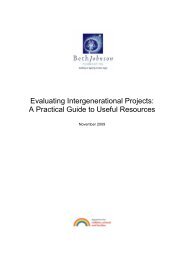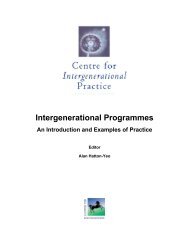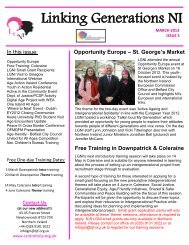Intergenerational Learning in Europe – Policies, Programmes ...
Intergenerational Learning in Europe – Policies, Programmes ...
Intergenerational Learning in Europe – Policies, Programmes ...
Create successful ePaper yourself
Turn your PDF publications into a flip-book with our unique Google optimized e-Paper software.
5. The EAGLE Toolkit for <strong>Intergenerational</strong> Activitiesbehave and approach schools. Time spent <strong>in</strong> preparationis rarely wasted and often the secret of success. It is essentialto organise preparation for all participants <strong>in</strong>volved asmutual understand<strong>in</strong>g and respect is a pre-requisite to asuccessful activity.If you are go<strong>in</strong>g to work with <strong>in</strong>dividuals or groups ofpeople you need to th<strong>in</strong>k about how you are go<strong>in</strong>g to getthem ready to take part as effectively and satisfy<strong>in</strong>gly aspossible. If you were go<strong>in</strong>g to br<strong>in</strong>g a group of young andold people together you would might want to spend timewith them separately first to prepare them for meet<strong>in</strong>g together.As well as obvious th<strong>in</strong>gs such as listen<strong>in</strong>g to eachother it might be helpful to talk to people about what theyexpect of the other group and how they th<strong>in</strong>k they mightbehave towards each other.It I also important to get people to th<strong>in</strong>k about boundariesand how they need to keep themselves safe and notoffend anyone else. It is essential that both groups respectthe other’s views, listen<strong>in</strong>g even if they disagree.Implementation & Management4.This is the stage where you translate your plans<strong>in</strong>to activity. Thetime you spent onplann<strong>in</strong>g and engagementwill be a major contributorto the success of theactual programme. Do not beafraid of be<strong>in</strong>g flexible at thisstage as you start the piece of work. Cont<strong>in</strong>ue to listento people, respond to their ideas and op<strong>in</strong>ions and makesure from the beg<strong>in</strong>n<strong>in</strong>g that everyone feels they havea part <strong>in</strong> whatever activity or activities are tak<strong>in</strong>g place.<strong>Intergenerational</strong> work is about participation and mutualrespect. Do<strong>in</strong>g together and not do<strong>in</strong>g to.Μonitor<strong>in</strong>g & Evaluation5.When you developed your project you will havehad an idea about the pathway, or stages, youexpected the project to follow. Regular monitor<strong>in</strong>gwill enable you to see if the project is on track and ifnot give you the chance to take any necessary steps to addressany problems or arise. Equally there may have beenth<strong>in</strong>gs that happened unexpectedly that may show a betterway to do th<strong>in</strong>gs and these need to be identified andacted upon.If you are to demonstrate the quality of your programmewe need to be able to demonstrate what has changed becauseof our work. Go<strong>in</strong>g back to the outcomes proposed<strong>in</strong> the orig<strong>in</strong>al plan for this project th<strong>in</strong>k about how youwill measure or assess if they have been achieved? Howwill you go about evaluat<strong>in</strong>g or measur<strong>in</strong>g the success ofyour programmes? Examples of evidence can <strong>in</strong>clude:• Participants feedback sheet;• Recorded evidence & statistics;• Produced materials/objects;• Monitor<strong>in</strong>g Reports;• Questionnaires;• Evaluation Reports;• End of Programme Report;• Data/Evidence Collected;• Case Studies.In some sett<strong>in</strong>gs and countries it may be possible to developpartnerships with Universities and teach<strong>in</strong>g <strong>in</strong>stitutionsfor students to undertake evaluation studies as partof their academic course.20






